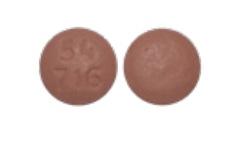Desvenlafaxine Disease Interactions
There are 8 disease interactions with desvenlafaxine.
- Depression
- Renal disease
- Glaucoma
- Hypertension
- Hyponatremia
- Mania
- Seizures
- Urinary tract obstruction
SNRI antidepressants (applies to desvenlafaxine) depression
Major Potential Hazard, Moderate plausibility. Applicable conditions: Bipolar Disorder
Adult and pediatric patients with depression and other psychiatric disorders may experience worsening of their symptoms and may have the emergence of suicidal thoughts and behavior. Patients should be monitored appropriately and observed closely for worsening of their symptoms, suicidality or changes in their behavior, especially during the first few months of treatment, and at times of dose changes. Discontinuing the medication should be considered if symptoms are persistently worse, or abrupt in onset. It may be prudent to refrain from dispensing large quantities of medication to these patients.
SNRI antidepressants (applies to desvenlafaxine) renal disease
Major Potential Hazard, Moderate plausibility. Applicable conditions: Renal Dysfunction
The clearance of SNRI antidepressants is decreased in subjects with renal impairment. SNRIs should be used with caution in this group of patients and a dose adjustment is recommended in those with moderate and severe renal impairment. The use of SNRIs is not recommended in patients with end-stage renal disease.
SNRI antidepressants (applies to desvenlafaxine) glaucoma
Moderate Potential Hazard, Moderate plausibility. Applicable conditions: Glaucoma (Narrow Angle)
SNRI antidepressants cause pupillary dilation that may trigger an angle closure attack in patients with anatomically narrow angle without iridectomy.
SNRI antidepressants (applies to desvenlafaxine) hypertension
Moderate Potential Hazard, Moderate plausibility.
Selective serotonin and norepinephrine reuptake inhibitor antidepressants (SNRIs) have been associated with sustained increases in blood pressure. Therapy with SNRI antidepressants should be administered cautiously in patients with preexisting hypertension. Blood pressure should be assessed prior to initiating treatment and monitored regularly. The dose should be reduced or discontinued if necessary.
SNRI antidepressants (applies to desvenlafaxine) hyponatremia
Moderate Potential Hazard, Moderate plausibility. Applicable conditions: Dehydration
Treatment with SNRI antidepressants can cause hyponatremia. Caution should be used when treating patients with hyponatremia or at greater risk of hyponatremia such as the elderly, patients taking diuretics or who are volume depleted.
SNRI antidepressants (applies to desvenlafaxine) mania
Moderate Potential Hazard, Moderate plausibility. Applicable conditions: Bipolar Disorder
Therapy with SNRI antidepressants can cause activation of mania and hypomania and should be used with caution in patients with personal or family history of mania, hypomania, bipolar disorder, and other mood disorders.
SNRI antidepressants (applies to desvenlafaxine) seizures
Moderate Potential Hazard, Moderate plausibility.
SNRI antidepressants may trigger seizures and should be administered with caution in patients with a seizure disorder.
SNRI antidepressants (applies to desvenlafaxine) urinary tract obstruction
Moderate Potential Hazard, Moderate plausibility. Applicable conditions: Urinary Tract Infection
SNRI antidepressants have a noradrenergic effect and can affect urethral resistance. Caution should be used in patients with a history of dysuria, prostatic hypertrophy, prostatitis, and other lower urinary tract obstructive disorders.
Switch to professional interaction data
Desvenlafaxine drug interactions
There are 481 drug interactions with desvenlafaxine.
Desvenlafaxine alcohol/food interactions
There are 2 alcohol/food interactions with desvenlafaxine.
More about desvenlafaxine
- desvenlafaxine consumer information
- Check interactions
- Compare alternatives
- Pricing & coupons
- Reviews (1,384)
- Drug images
- Side effects
- Dosage information
- During pregnancy
- Support group
- Drug class: serotonin-norepinephrine reuptake inhibitors
- Breastfeeding
- En español
Related treatment guides
Drug Interaction Classification
| Highly clinically significant. Avoid combinations; the risk of the interaction outweighs the benefit. | |
| Moderately clinically significant. Usually avoid combinations; use it only under special circumstances. | |
| Minimally clinically significant. Minimize risk; assess risk and consider an alternative drug, take steps to circumvent the interaction risk and/or institute a monitoring plan. | |
| No interaction information available. |
Further information
Always consult your healthcare provider to ensure the information displayed on this page applies to your personal circumstances.


